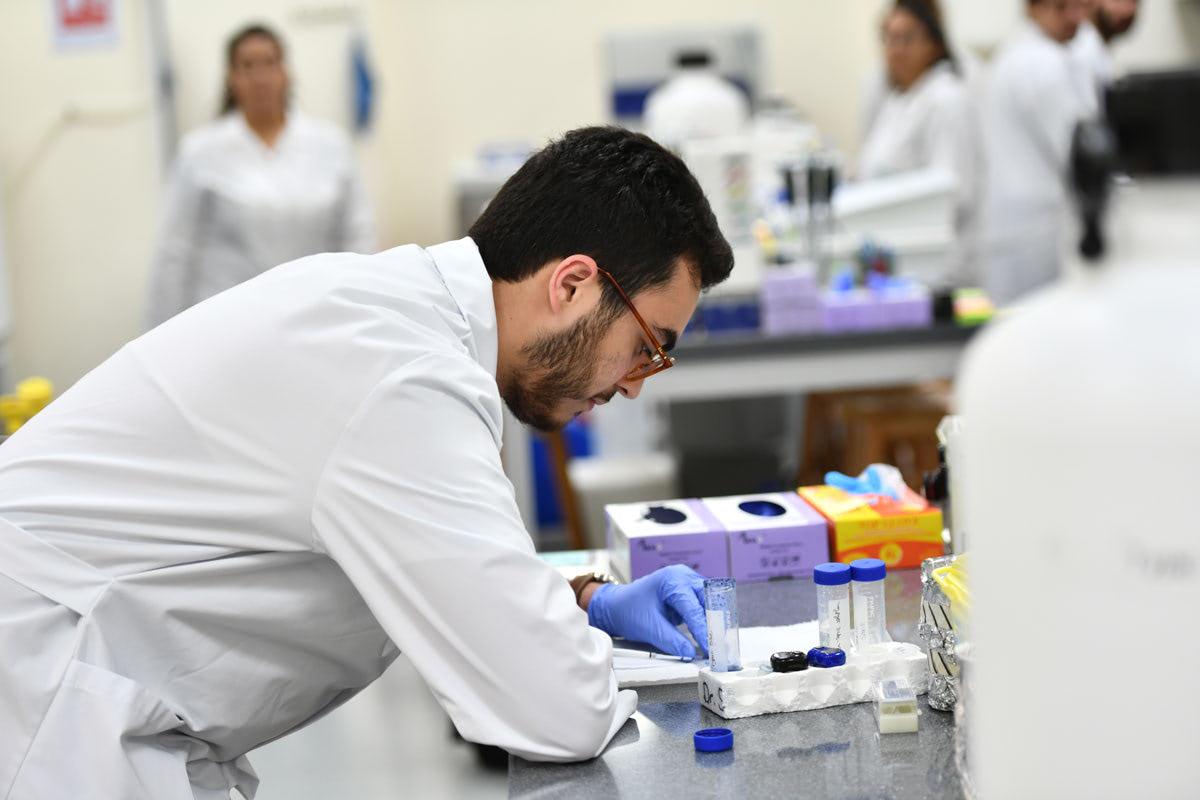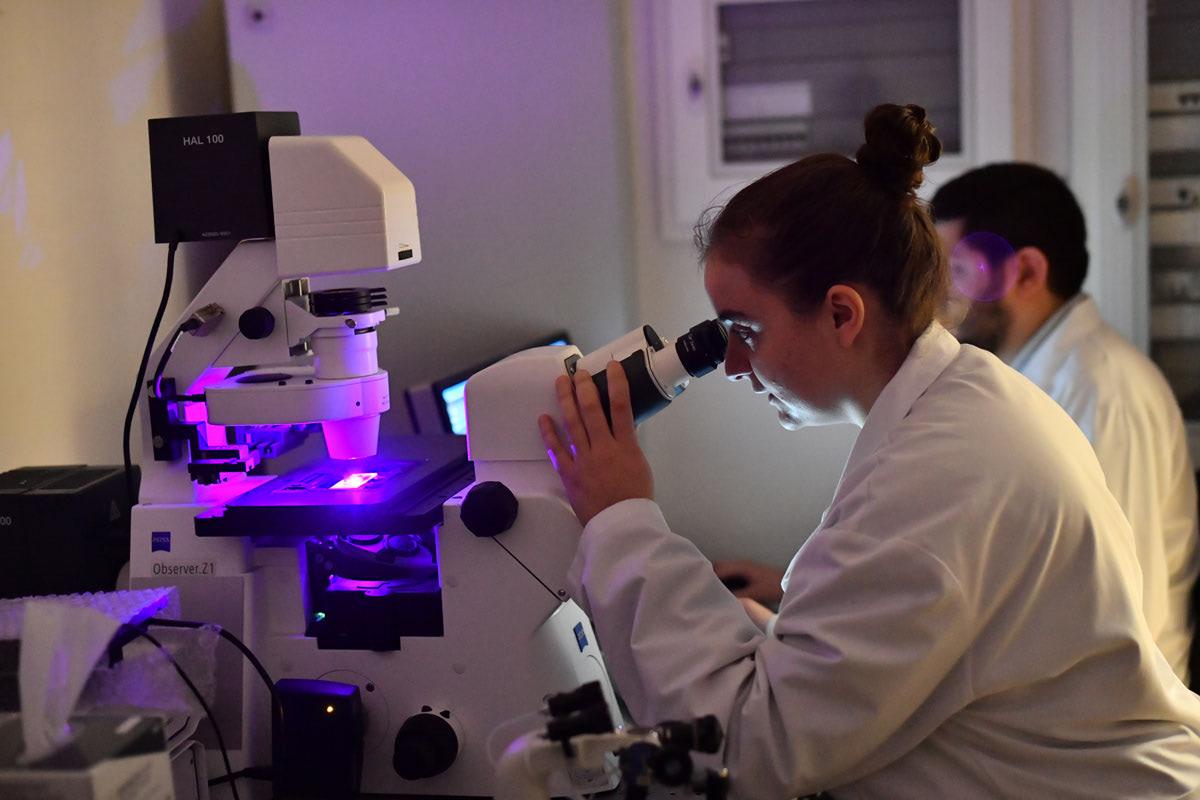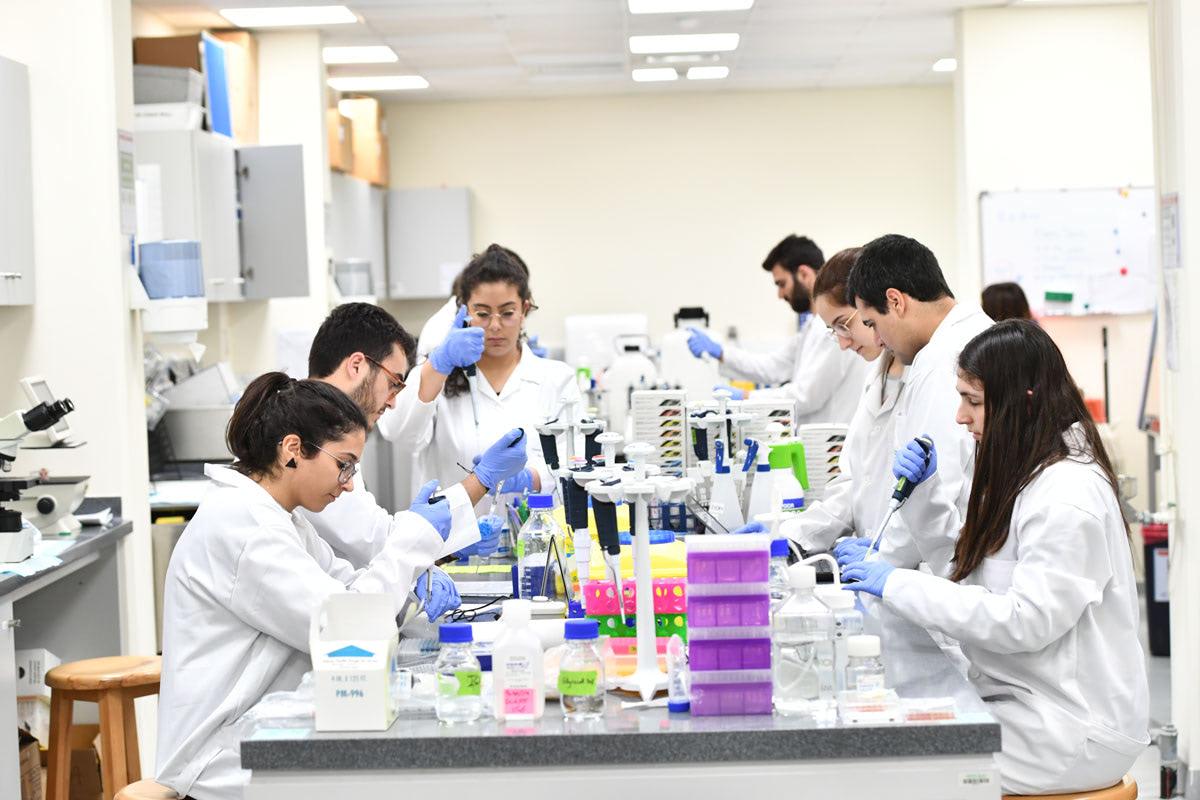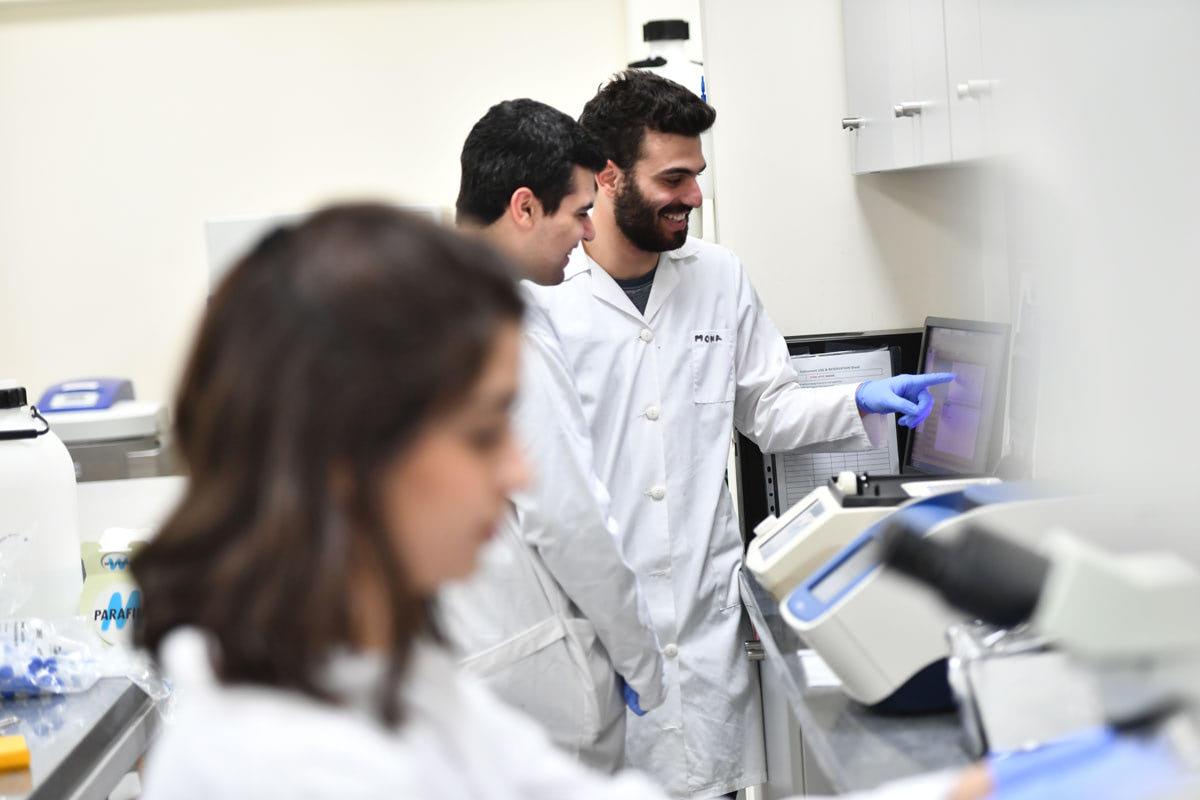Biology Labs
Biology labs on both campuses are equipped for student teaching and research needs in the various health, natural sciences and computer science disciplines.
Beirut Campus
The Biology facilities on the Beirut campus consist of three teaching labs and four research labs equipped with state-of-the-art instrumentation supporting all disciplines of biology.
Located on the first and second floors of Sage Hall, the labs serve both undergraduate and graduate students.
Teaching Labs
Biology Lab (Sage 205)
This new teaching lab has just been renovated and will be functional starting Spring 2023. It will accommodate balances, a water bath, a pH meter, stirrers, a spectrophotometer, a centrifuge, a refrigerated centrifuge, a fridge, an under-counter freezer and an incubator. A cabinet at the lab is dedicated to storing microscopes, displays and models.
The lab will also be equipped with audio-visual systems and LCD projectors.
Biology Lab (Sage 305)
The equipment within the first Teaching Lab includes microscopes, a stereomicroscope, balances, a pH meter, water baths and shaking water baths, centrifuges, a concentrator, a stomacher, a trans-illuminator, an ice machine, two incubators, visible and UV-visible spectrophotometers, 2 autoclaves, different types of electrophoresis setups (Horizontal and Vertical) and a dishwater.
Biology Lab (Sage 307)
This second lab contains balances, a water bath, a pH meter, stirrers, spectrophotometers, 4 fridges, and a microwave. Also within the lab there is a large set of preserved animal and plant specimens as well as displays for sophomore labs.
Both labs are equipped with audio-visual systems and LCD projectors.
Research Labs
Biology Research Lab (Sage 201)
The research in this lab is mainly focused on cell and cancer biology. The following equipment is present to fulfill the requirements for advanced research: 1 biosafety cabinet, 1 CO2 incubator, 1 ultralow freezer (-80°C), 1 freezer (-20°C), 1 orbital-shaker, a needle puller, a homogenizer, a heat-block.
Biology Research Lab (Sage 202)
This core laboratory is dedicated to supporting advanced research across diverse areas of biology. It houses a comprehensive range of high-performance instruments designed to meet the demands of rigorous scientific investigation, including a plate reader, Chemidoc gel imaging system, real-time quantitative PCR (RT-qPCR), conventional PCR and a flow cytometer.
Biology Research Lab (Sage 302)
The research in this lab is mainly focused on cell and cancer biology, and the following equipment is present to fulfill the requirements for advanced research: 2 biosafety cabinets, 3 CO2 incubators, an ultralow freezer (-80°C), a freezer (-20°C), a liquid nitrogen tank, an orbital-shaker, a needle puller, a homogenizer, a heat-block, an inverted microscope, a microtome and paraffin embedding unit, a UVP nox imaging system, in addition to basic equipment (balance, water bath, incubator, stirrer, pH meter).
Biology Research Lab (Sage 303)
In this lab, the main field of research is genetics, and the equipment available is as follows: a qPCR (real-time PCR), a PCR master-cycler, a biological safety cabinet, 2 CO2 incubators, an inverted microscope, a molecular imaging system (Chem DOC XRS+), a liquid nitrogen tank, a freezer, an autoclave, a refrigerated centrifuge, in addition to the basic equipment (balance, water bath, stirrer, pH meter).
Biology Research Lab (Sage 304)
The research in this lab is also focused on cell and cancer biology with the following equipment: a biological safety cabinet, 2 CO2 incubators, a liquid nitrogen tank, refrigerated centrifuge, a flow cytometer (BP Accuri), a microplate reader (Varioskan Flask), an inverted microscope, 2 fridges, an ultralow freezer (-80°C), and basic equipment (balance, water bath, stirrer, pH meter).
Biology Research Lab (Sage 306)
The main field of research in this lab is microbiology, and for this the following equipment is available: a biological safety cabinet, PFGE (pulsed-field gel electrophoresis), a freezer (-20°C), an autoclave, 2 incubators, 1 shaking incubator, a small liquid nitrogen tank, and basic equipment (balance, water bath, stirrer, pH meter).
The Fluorescent Microscopy Lab (Sage 302A)
Annexed to the Biology research lab 302 is a small lab equipped with a state-of-the-art inverted fluorescent microscope.
Fluorescent Microscopy Room II (Sage 312)
This small room will be reformed to be equipped by the end of this year with another state-of-the-art Nikon Ti2-E inverted wide-field fluorescence microscope.
Byblos Campus
The Biology Facilities on the Byblos campus consist of 3 teaching labs and several research labs that are located in the Science and Block A buildings. These labs serve both undergraduate and graduate students and are well-equipped with sophisticated and modern instrumentation supporting various disciplines of biology.
Teaching Labs
The Teaching Labs accommodate students majoring in biology, nutrition and pharmacy in addition to freshman students.
Biology Lab (Sci 307)
This lab is reserved for teaching the junior and senior biology labs. It accommodates around 18 students and is equipped with microscopes and basic lab equipment (balances, pH meters, vortex mixers, hot-plate stirrers, micropipettes, refrigerators/freezers and incubators.
Biology Lab (Sci 308)
Sci 308 is a preparatory lab that is also sometimes used for teaching undergraduate and graduate labs and houses general equipment such as autoclaves, a fume hood with a flammables cabinet, UV-Vis spectrophotometers, centrifuges and water baths, in addition to basic lab equipment.
Annexed to the lab in Science 308 are two smaller rooms, one serving as a storeroom for chemicals, glass and plastic ware, with the other containing a high-speed centrifuge and an ultracentrifuge.
Biology Lab (BA 404)
This lab is reserved for teaching the introductory biology labs taken by biology, pre-med, nutrition, pharmacy and nursing students. It accommodates around 18 students and is equipped with microscopes and basic lab equipment (balances, pH meters, vortex mixers, hot-plate stirrers, micropipettes, refrigerators/freezers). It also has UV-Vis spectrophotometers, a centrifuge and a water bath.
Research Labs
The Research Labs accommodate senior undergraduate biology students as well as graduate students in biological sciences and postdocs.
Microbial Genomics Lab (Sci 306)
This lab, located in Sci 306, is equipped with 3 thermal cyclers, a quantitative real-time PCR system, a sanger DNA sequencer/genetic analyzer and an NGS long-read sequencing device, in addition to a focused ultrasonic DNA, a chromatin shearing instrument and a DNA fragment size selection instrument. Basic lab equipment here includes a fluorometer, vortex mixers, thermomixers, a microcentrifuge, micropipettes and a refrigerator/freezer. The following genomics software is available for bioinformatics data analysis: BioNumerics, CLC Genomics Workbench and Ridom StaphType.
Graduate Core Lab (Sci 305)
The graduate core lab in Sci 305 is equipped with several electrophoresis set-ups and gel imaging systems: 1D SDS PAGE small and large systems, a Western blot gel transfer apparatus, an IPG-strips iso-electric focusing instrument and a 2D SDS PAGE system. The imaging systems include a chemiluminescent gel and blot and UV imaging systems with gel and blot image analysis software and a high-resolution gel scanner with imaging software and 2D gel analysis software.
One end of this lab is dedicated to cell and tissue culture work with a CO2 incubator, a biological safety cabinet, and an inverted microscope.
This lab also has a microplate reader, a microspectrophotometer, a vacuum concentrator, a vacuum blotter, an automated gel stainer/destainer, a hybridization oven/UV cross-linker, a radioactive/luminescent microplate counter and tissue and cell homogenizers and sonicators, in addition to basic lab equipment. It also has two PC terminals, a printer and a scanner to serve the graduate students’ study and research and GA work.
Microbiology Lab (Sci 304A)
The Microbiology lab, Sci304A, is equipped with all basic microbiology instruments, including a biosafety cabinet, 5 incubators, 1 CO2 incubator, 4 shaking incubators, 2 water baths, 2 autoclaves, a stomacher, 2 vacuum pumps and 2 water filtration apparatuses in addition to a pulse-field gel electrophoresis unit and basic lab equipment.
Cell Biology Lab (Sci 501)
In addition to basic lab equipment, Sci 501 houses two CO2 incubators, a biological safety cabinet, a liquid nitrogen storage tank, a Western blot gel running and transfer apparatuses, an X-ray imaging system, and an inverted microscope.
Microscopy Room (Sci 310)
Sci310 houses a state-of-the-art fluorescent inverted microscopy and imaging system.
Biology Labs (BA 302E)
Three sections of BA302E are dedicated to cell culture with a CO2 incubator and a biological safety cabinet in each, while the remaining section is dedicated to Western blot gel running and transfer, autoclaves and refrigerators and freezers. A storage room is available in BA303A.
The exhaustive list of equipment that are housed in BA302E in addition to basic lab equipment includes: a microplate reader for absorbance, fluorescence and luminescence, a thermal cycler, a quantitative real-time thermal cycler, a fluorescent cell imager, a microspectrophotometer, a laminar flow clean bench, a dissection microscope, and a UV irradiation system.
Instrumental Room (BA 302D)
This room houses a flow cytometer and chemiluminescent gel/blot imager.
Cold Room (Sci 509)
A cold room in Sci509 is also available for storage and experiments requiring low temperature. Outside it is a -80°C deep freezer.



